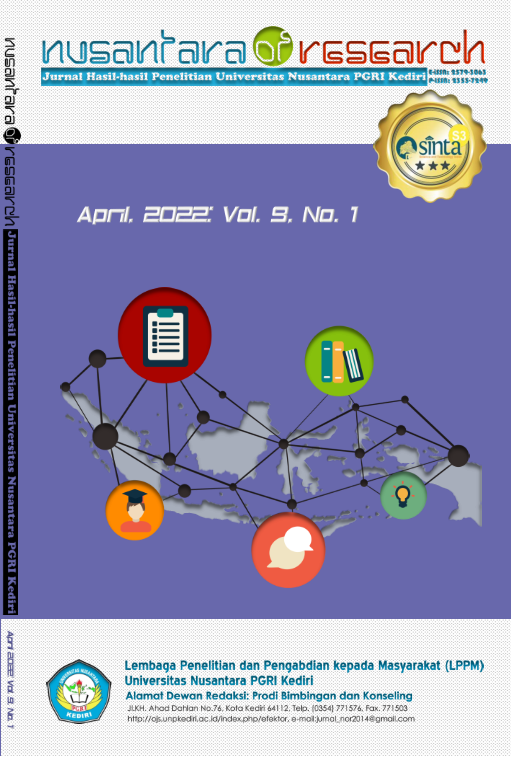Vocational School Student Career Maturity Scale
Main Article Content
Abstract
The results of the preliminary study found that the career maturity of SMK students was low, including a) students did not have plans for continuing their careers after graduating from school, b) students did not have an effort to find information on the chosen career major, c) students were not interested in reading information about the chosen career, and students have difficulty deciding where to go and what to do when they graduate from school. Researchers need to strive to increase the career maturity of vocational students. To measure the increase in career maturity in this effort, the researcher developed an instrument in the form of a valid and reliable vocational maturity scale for vocational students. Therefore, this article describes the validity and reliability test of the career maturity scale of vocational students which has been developed by the researchers themselves. Based on the results of the validity test that was given to 139 students of class XI SMK Pemuda Papar, 55 valid scale items were obtained with a table of 0.166 and a reliable level of 0.892. Of the 55 valid items, all represent every indicator of career maturity. Based on the validity and reliability test of the instrument, the career maturity scale can be used to measure the career maturity level of the Pemuda Papar Vocational School students at the next research stage.
Downloads
Article Details
Issue
Section
Authors who publish with this journal agree to the following terms:
- Copyright on any article is retained by the author(s).
- The author grants the journal, the right of first publication with the work simultaneously licensed under a Creative Commons Attribution License that allows others to share the work with an acknowledgment of the work’s authorship and initial publication in this journal.
- Authors are able to enter into separate, additional contractual arrangements for the non-exclusive distribution of the journal’s published version of the work (e.g., post it to an institutional repository or publish it in a book), with an acknowledgment of its initial publication in this journal.
- Authors are permitted and encouraged to post their work online (e.g., in institutional repositories or on their website) prior to and during the submission process, as it can lead to productive exchanges, as well as earlier and greater citation of published work.
- The article and any associated published material is distributed under the Creative Commons Attribution-ShareAlike 4.0 International License
How to Cite
References
Borg, W.R & Gall, M.D. 1983. Educational Research an Introduction with Plain. New York: McGaw Hill.
Crites, J. O. 1981. Career Counseling: Models, Method, and Materials. New York: McGraw Hill.
Dillard, J. M. 1985. Life Long Career Planning. Ohio: A Bell & Howell Company.
Febriyanti, Citra. 2016. Pengembangan Skala Pengukuran Perilaku Pro Lingkungan: General Ecological Behavior (GEB) Scale. JP3I. 5(2), 153-182.
Hamzah, Amir. 2019. Kematangan Karier Teori dan Pengukurannya. Batu: Literasi Nusantara.
Healy, Ch. C. (1982). Career Gaidance Through the Life Stages. Los Angeles: Allyn and Bacon, Inc.
Nunnaly, J.C. (1981). Psychometric Theory (2nd edition). New York: McGraw-Hill Publishing Company.
Savickas, M.L. (1999). The Transition from School to Work: A Developmental Perspective. The Career Development Quartely. 4, 326-336.
Sinamora, Henry. 2006. Manajemen Sumber Daya Manusia. Yogyakarta: STIE YKPN.
Suharman. 2012. Pengembangan Skala Kemandirian. Jurnal Psikologi Indonesia. 1(2), 66-76.
Suryabrata, S. (2005). Pengembangan Alat Ukur Psikologis. Yogyakarta: Penerbit Andi.
Wijaya, F. (2008). Hubungan antara Kematangan Karir dengan Motivasi Belajar pada Siswa Kelas X MAN Cibinong. Skripsi. Tidak Dipublikasikan. Jakarta: Gunadarma.
Zulkaida, A., dkk. 2007. Pengaruh Locus of Control dan Efikasi Diri terhadap Kematangan Karir Siswa Sekolah Menengah Atas (SMA). Proceeding PESAT, Agustus 21-22 2007. Jakarta Barat: Auditorium Kampus Gunadarma.




